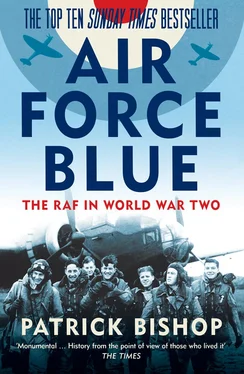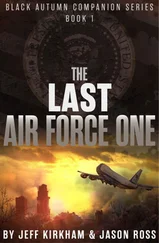1
The faint feeling of dread that was always there in the bad old days was absent this morning. Dawn was still several hours away and inside the chilly briefing room eighteen crews from 9 Squadron were gathered to hear their orders. They smoked and chatted, waiting for the CO to arrive to reveal the location of the target. Occasionally there was a burst of laughter. Today the hilarity sounded unforced and not just a cover for jangling nerves. The date was 25 April 1945 and Germany was in its death throes. One precious thought united the 126 men present: in twelve hours’ time their war might be over and they would never have to do this again.
If so, it seemed likely they were going out with a bang. The previous evening the CO had toured the messes advising drinkers to take it easy as ‘something special’ was in the offing.1 The word from Flights was that the fuel order was for 2,154 gallons per aircraft.2 That meant an extra-long trip. And what was the BBC doing here? Next to the platform at the front of the room a reporter and technician were fiddling with microphone and disc recorder.
The large map of Europe on the wall behind the platform offered a clue. It was the first thing the crews looked at when they trooped in. The red tape that traced their route to the target ‘started at Bardney, our base, ran down to the South Coast and across the Channel,’ remembered Flight Sergeant Fred Whitfield, who, though ‘tour expired’ after completing thirty trips as a rear gunner, had volunteered to carry on.3 ‘At that point it diverted across France on a dog leg and ended up in Southern Germany.’ Whitfield’s first thought was that it ‘looked like a daylight raid on Munich’.
The orderly officer called the crews to attention and with a scraping of chairs they got to their feet as Wing Commander Bazin walked down the aisle followed by his specialist officers, stepped onto the dais and began the briefing.
Jim Bazin, DFC and bar, seemed indestructible. Born in Imperial India, raised in a comfortable middle-class family in the North East of Britain, he served as a part-timer in an RAF auxiliary squadron for four years before the war and fought from the first day to what was now surely almost the last. By any reckoning of the odds he should have been dead several times over. Whatever terrors he had experienced had left no outward mark on him. When he spoke, it was in a cultured, amused accent, more like a university professor than a warrior.
‘Well, Gentlemen,’ he announced. ‘This is the big one.’4 He explained that at this late stage in the war they were being given a chance to land a blow on the man who had started it all. They were off to bomb Hitler’s mountain retreat at Berchtesgaden. ‘Your particular aiming point for this attack is the house where this gentleman is supposed to live,’ he told them. ‘Whether he’s there is another matter.’ He paused for a second before going on. ‘But no doubt there will be plenty of people there to benefit from it.’5 The room rocked with laughter.
They settled down as the met, navigation and intelligence officers delivered the weather forecast and took them through the technicalities of route, plan of attack and expected opposition. When they finally filed out into the Lincolnshire night, heavy with the muddy smell of the surrounding fields, everyone was talking excitedly. They had all heard of Berchtesgaden, of course. To the older ones who remembered it from pre-war newsreels, it brought back memories of Chamberlain and Munich and national humiliation. For the younger airmen it was a name from the news bulletins, one of the three main military headquarters from which Hitler directed his forces. None of those who planned Bomber Command operations had seen fit to attack it before. Now, for reasons that no one explained in the briefing, the time had finally come.
The sky was clear and the moon, one day away from fullness, silvered the ridges of the potato fields surrounding the base. The aerodrome stood just north of the village of Bardney on the plain which stretches north from the Lincolnshire fenlands to the rising hills of the Wolds. It was one of more than a hundred bomber stations built during the early years of the war, a standard pattern of three concrete runways and three hangars, interspersed with utilitarian huts and sheds where the airmen, ground crews and WAAFs ate, washed and slept.6
There were two hours to take-off and much to be done beforehand. Operations boiled down to a succession of routines which had to be followed to the letter if you wanted to succeed and survive. But first they would eat, a meal that had long ago become a cliché: bacon and eggs and wodges of bread and margarine, washed down with American canned orange juice and mahogany-coloured tea.
They cleared their plates and headed for the crew room to climb into multi-layered flying gear and pick up their parachutes. For those who needed it there was a detour to the latrines to empty their bowels before they all climbed into canvas-covered four-ton lorries that trundled them out to dispersal where the bombers loomed, casting long moon shadows on the tarmac. The ground crew had been there for hours, refuelling, bombing up, checking the control surfaces and undercarriage, fussing over the machine as if it was their own lives that were at stake.
Those flying were swaddled like Michelin men but it still felt cold. The metal tube of the fuselage carried its own special chill. They climbed the five rungs of the ladder, through the hatch behind the gun turret amidships, and struggled to their posts. Pilot, flight engineer, navigator, bomb aimer and wireless operator wriggled forward to the nose, clambering over the thick spar that pinned together the bomber’s 102-foot wingspan. The gunners settled into their solitary nests behind them.
Each man began to run through the litany of checks and drills, second nature now from years of training and practice. For the gunners it took a few minutes. For the pilot and flight engineer it was more like half an hour. Then the pilot shouted down to the ground crew that he was ‘ready for starting’. A mechanic jumped forward to work the Ki-Gas pump and prime the carburettor of the first engine. Someone swung a white torch to indicate which engine to fire up first. From his seat, squeezed in next to the pilot, the flight engineer flipped on booster coil and main ignition switches and opened the master fuel cock. The pilot thumbed the starter button and with an explosive thud and a volley of flame and smoke, one by one the Merlin engines burst into life, filling the rural silence with a deep-throated roar. In the farms and villages around the bomber bases the noise was now as familiar as birdsong.
More minutes passed before the dials showed every engine had reached the right temperature and pressure. It was a laborious business but there was no rushing it. The machine was what got you there and got you home. This day of all days, with the finishing line in sight, was no time to get careless.
A-Able was the first away. It was 5 a.m. and still pitch-black but the clear sky promised a fine day. The Lancaster moved off jerkily, stopping and starting as the pilot tested the flaps and brakes. It rolled onto the runway, waiting for the signal on the Aldis lamp mounted on the control van to flash from red to green. Lining the tarmac were the usual party of WAAFs and ground staff gathered to wave and smile and pray for a safe return. This morning there were others present. Standing among them were the BBC reporter and soundman who had been at the briefing. That evening the journalist’s report, delivered in a bright, modern voice, very different from the plummy tones of the pre-war Corporation, would go out on the evening news:
‘Hallo BBC. This is Brian Bliss with Bomber Command. It’s Zero Hour, the attack is on and the first Lancaster’s swinging into position at the head of the runway right opposite me now … here she comes … remember this is the squadron which sank the Tirpitz and now they’re off to Berchtesgaden with twelve thousand pounders. Twelve thousand pounders! And they’re taking the attack literally to Hitler’s doorstep!’7 Millions of listeners heard the engine note rising sharply as the revs climbed, then fading as Bliss, almost shouting now, announced that ‘A-Able is off … a marvellous sight as she races by!’
Читать дальше












